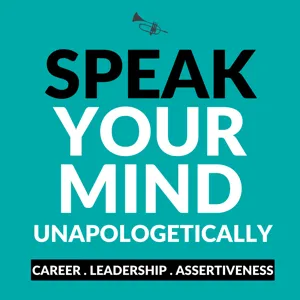Podcast Summary
Overcoming Fear of Public Speaking: Learn practical tips for boosting confidence when speaking in public, even during pandemic times, from Rachel Oman's personal experience and expert advice.
Many people experience anxiety when speaking in public, and it's a common fear that affects individuals in various ways. Rachel Oman, who was featured in the episode, shared her lifelong fear of public speaking that had worsened during the pandemic, making it difficult for her to socialize and enjoy events. The episode provided advice on becoming a more confident public speaker, with reporter Kyle Norris leading the discussion. The advice applies to anyone, whether the idea of speaking in front of a crowd makes you uncomfortable or excites you. The episode also included sponsor messages from Whole Foods Market, Apple Card, Integrative Therapeutics, and TED Health. Whole Foods Market was promoting their wallet-friendly options for hosting a celebratory brunch, while Apple Card was highlighting their daily cash rewards program. Integrative Therapeutics was introducing their clinician-curated supplements now available on Amazon, and TED Health was promoting their podcast where doctor Shoshana Ungerleiter and leading health experts discuss new medical breakthroughs and relevant health questions.
Overcoming public speaking anxiety with Toastmasters and improving communication skills: Embrace imperfections, focus on authenticity, and practice in uncomfortable situations to build confidence and become an effective communicator.
Practicing public speaking, even in uncomfortable situations, can help build confidence and improve communication skills. Rachel Oman, who once had a debilitating fear of public speaking, found solace and success in her local Toastmasters club. Through improvised speeches and focusing on reducing filler words, she was able to overcome her anxiety and even win first place in a competition. Lauren Dominguez Chan, a professional speechwriter, emphasizes the importance of setting realistic expectations and embracing imperfections in public speaking. By letting go of the notion of what it means to be a "good" speaker and focusing on authenticity, anyone can become an effective communicator. Moreover, critiquing someone's speaking style can unintentionally perpetuate biases, so it's essential to remember that everyone has unique strengths and weaknesses.
8 words: Focus on authenticity and connection: Authenticity and connection are key to good speaking, not conforming to a specific identity or way of speaking. Identify your core message and deliver it in a way that resonates with your audience.
Good speaking is not about conforming to a specific identity or way of speaking, but rather about being authentic and connecting with your audience. The harmful belief that a good speaker must sound a certain way is rooted in biases and can be dehumanizing. Instead, focus on identifying your core message and delivering it in a way that resonates with your audience. This may involve some preparation, but remember that you are an expert on your life and experiences, and you've already done some work in the form of public speaking, whether it be in classrooms or other settings. By focusing on your core message, you can make every other decision related to your speech, from structure to specific stories and concrete images. Ultimately, the goal is to prepare yourself to speak in a way that allows you to connect with your audience in the moment.
Writing Memorable Speeches: Core Message, Logistics, and Engaging Stories: To write effective speeches, identify a core message, prepare logistically, and incorporate engaging stories with vivid, sensory details.
Effective speechwriting involves identifying a core message, preparing logistically, and incorporating engaging stories. During the pandemic, Lauren helped write speeches for Surgeon General Vivek Murthy, emphasizing hope and support for Americans. For graduating public health students, she highlighted their importance and encouraged leaning on both expertise and support. To write a speech, start by getting logistical details down, like audience and context. Then, create "sticky stories" with vivid, sensory details that relate to your core message. By focusing on these elements, you can craft memorable and impactful speeches.
Effective Speech: Planning, Writing, and Practicing: To craft an effective speech, plan with a clear structure, write conversationally, experiment with different speech structures, engage with others during the process, and practice regularly.
Crafting an effective speech involves planning, writing for the ear, and practicing. First, create an outline with a clear structure for your main points and sticky stories. Second, write conversationally with short, simple sentences for the ear. Third, experiment with different speech structures. Fourth, engage with others during the process by practicing with them or recording yourself. Lastly, practice regularly to improve your skills and build confidence. Remember, public speaking is about connecting with your audience, so put in the effort to make your message meaningful and memorable.
Improve public speaking skills in a supportive environment: Joining a Toastmasters group can provide constructive feedback, a safe space to make mistakes, and structured improvement for public speaking skills.
Practicing public speaking in a supportive environment, such as a Toastmasters group, can significantly improve your skills and build confidence. Rachel Oman shared her experience of bringing her daughter to a Toastmasters meeting, where they both discovered the benefits of constructive feedback and a safe space to make mistakes. Rachel's first speech at Toastmasters was nerve-wracking, but she received positive feedback that helped her relax and improve. Her daughter, Brynn, even fell in love with public speaking after volunteering to give an impromptu speech. Rachel emphasized that forcing yourself to do something scary, like public speaking, can lead to personal growth and a sense of accomplishment. The structured and supportive nature of Toastmasters meetings allows individuals to receive targeted feedback on their content, grammar, and filler words, enabling them to make meaningful improvements.
Become an Effective Public Speaker: Authenticity, Core Message, Preparation, Relatable Stories, Writing for the Ear, Practice, and Staying Present: Anyone can become an effective public speaker by being authentic, identifying a clear core message, preparing logistically, using relatable stories, writing for the ear, practicing, and staying present.
Anyone can become an effective public speaker by being authentic, identifying a clear core message, preparing logistically, using relatable stories, writing for the ear, practicing, and staying present. Reporter Kyle Norris shares these insights from expert Lauren Schiller in the LIFE KIT episode on improving public speaking skills. Knowing that you already possess the ability to speak well is the first step. Next, determine your core message, which should resonate with your audience. Preparation includes understanding event logistics and finding relevant stories. Writing for the ear means keeping sentences short and practicing in front of a mirror or supportive audience. Ultimately, the goal is to connect with your audience by being present and true to yourself. For more tips on public speaking, listen to other LIFE KIT episodes on giving a toast and telling a good story, available at npr.org/lifekit. Remember, you're not alone in this process, so lean on supportive people for help and feedback.
Understanding People's Decisions: Psychology and Economics: Explore the psychology and economics of decision-making through stories from Nobel laureates, authors, and athletes on 'Choiceology' podcast. Stay informed in today's world, and consider flexible educational opportunities like Capella University's FlexPath.
The importance of understanding the psychology and economics behind people's decisions. The podcast "Choiceology" explores this concept through stories from various sources, including Nobel laureates, authors, and athletes. This insight can help us make better decisions in our own lives. Additionally, the discussion highlighted the significance of staying informed in today's world, especially as local newspapers continue to close down. Public radio serves as an essential resource for keeping up with current events and maintaining an informed community. Moreover, the mention of Capella University's FlexPath learning format offered a flexible solution for individuals seeking higher education at their own pace. This alternative educational approach allows learners to balance their studies with other commitments and receive support from caring professionals. In conclusion, the podcast "Choiceology" encourages us to understand the reasoning behind people's decisions, while the importance of staying informed and flexible educational opportunities were emphasized throughout the discussion.





